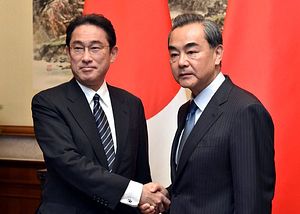China has urged Japan not to intervene in the South China Sea after Japanese Foreign Minister Fumio Kishida told reporters that he would try to convince Beijing to abide by the recent ruling of the Hague-based Permanent Court of Arbitration (PCA) on territorial disputes in the South China Sea during this week’s meeting of the Association of Southeast Asian Nations (ASEAN) in the Laotian capital of Vientiane.
“I’d like to emphasize importance of the rule of law and finding solutions through peaceful measures,” Kishida told reporters on July 24 before departing for Laos. Kishida is slated to meet with his Chinese counterpart, Foreign Minister Wang Yi, on the sidelines of the ASEAN foreign ministers meeting. Kishida’s comments immediately drew a harsh rebuke from the Chinese Ministry of Foreign Affairs. “Japan is not a party to the South China Sea issue, and considering its shameful history, it has no rights whatsoever to accuse China on the matter,” the ministry’s spokesperson, Lu Kang, said, according to Xinhua news agency.
Japan’s Foreign Ministry issued a statement immediately following the July 12 South China Sea ruling stating that it “strongly expects that the parties’ compliance with this award will eventually lead to the peaceful settlement of disputes in the South China Sea.” China was also critical of this statement by the Japanese foreign ministry. ”It is hoped that Japan would bear in mind the China-Japan relations and regional peace and stability, reflect upon its inciting actions on the South China Sea issue, stop poking its nose into and playing up this issue, and refrain from going further down the wrong path,” Lu Kang told reporters at a news conference on July 12.
Kang justified his rebuke of Japan with history. “During WWII, Japan invaded and appropriated China’s South China Sea islands, which were then recovered by China after Japan was defeated. There are clear provisions on this in the Cairo Declaration and the Potsdam Proclamation which set up the post-war international order. And Japan keeps promising to comply with relevant provisions of the Potsdam Proclamation. Japan should respect the post-war international order,” the spokesperson said.
In fact, Japan has been abiding by the Potsdam Proclamation, which stipulated that the “terms of the Cairo declaration shall be carried out and Japanese sovereignty shall be limited to the islands of Honshu, Hokkaido, Kyushu, Shikoku, and such minor islands as we determine.”
The 1943 Cairo declaration reads: “Japan shall be stripped of all the islands in the Pacific which she has seized or occupied since the beginning of the first World War in 1914, and that all the territories Japan has stolen from the Chinese, such as Manchuria, Formosa, and The Pescadores, shall be restored to the Republic of China.”
Neither document explicitly offers an answer to the question over the sovereignty of the Paracel and Spratly Islands. (Neither do the 1952 San Francisco Peace Treaty with Japan nor the 1972 Joint Communiqué between Japan and China.) Japan is also not a claimant state in the South China Sea maritime disputes. The Chinese spokesperson’s remarks are therefore somewhat misleading.
Furthermore, China has accused Japanese judge and retired diplomat, Shunji Yanai, of bias in his selection of four of the five judges for the arbitral tribunal. Xinhua news agency referred to him as the “manipulator behind [the] illegal South China Sea arbitration,” and a person “rightist, hawkish, close to Japanese Prime Minister Shinzo Abe, pro-American,” and “unfriendly to China.” Nevertheless, neutral observers have repeatedly confirmed that Yanai’s selection process was unbiased and in accordance with the United Nations Convention on the Law of the Sea.
Japan’s interests in the South China Sea are confined to upholding the so-called rule-based order while accommodating the wishes of its closest ally, the United States, to more actively engage in the region. There were unofficial discussions over joint U.S.-Japan patrols in the South China Sea last year. However, this was quickly denied by Japanese officials (See: “China is on ‘High Alert’ for Japan’s ‘Intervention’ in the South China Sea”). As of now, there appear to be no concrete plans for stepping up Japan’s role in the South China Sea.
































